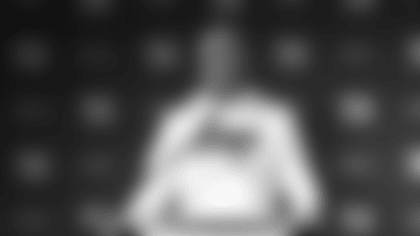Assistant Head Coach/Offensive Coordinator Mike Kafka
MIKE KAFKA: Morning everyone. Good start to the second week of training camp. It's been fun. A lot of great competition. Not only individual groups but O vs. D, Coach Bowen has done a great job with the staff and the players. It's been a really fun couple of weeks so far.
Q: How difficult was the last practice for the offense and what did you guys come of it evaluating about yourselves?
MIKE KAFKA: Yeah, every day is just an opportunity to learn and grow and get better. That's what training camp is all about. It's what practice is all about. Find the things that we're good at and things that we need to work on. We've got to look at those and go back and see where those things came up, whether it's fundamentals, whether it's scheme, whether it's a certain person in a spot. It's just all about growth and learning.
Q: What are you learning? Where do you see the identity of this offense? In what direction do you see it moving?
MIKE KAFKA: I think we're kind of in the middle of that right now and working through those positions, the schemes, and that's what training camp is about, is learning about yourself. So, we're just in the middle of that process.
Q: What do you see from (quarterback) Daniel (Jones) since he's come back?
MIKE KAFKA: Coming back from injury isn't easy at all. There's a lot of things you've got to work through, not only just physically but mentally, psychologically, and getting over that injury part of it. I think Daniel is doing a great job of managing that and putting him in those situations with a pocket and with the bodies around him and giving him the live action. I think every single day he's getting more and more comfortable with it, and I think he's doing a nice job.
Q: What has he shown you that's encouraging that this is the right step as a quarterback?
MIKE KAFKA: He's not flinching. Whether it's the plays, whether it's people up and around the pocket, he's stepping up and he's throwing it strong. Those are just every day. Again, he's just getting better and better with those type of things.
Q: How do you put (guard Greg) Van Roten into the mix?
MIKE KAFKA: He just got here a couple days ago, so he's only had a couple meetings now. I know he got caught up over the off day yesterday. So, we'll just see how it goes. He's just going to kind of jump in the mix with the rest of the guys and (Offensive Line Coach) Carm (Carmen Bricillo) and (Head Coach) Dabs (Brian Daboll) and myself, we'll go through that and evaluate it.
Q: When (quarterback) Daniel (Jones) has missed on some of the deep balls, he's generally been throwing short, under-thrown. When you look at that, do you see anything there? Is there anything you attribute that to? Is that something maybe that when you're coming back from a knee injury and it's a plant leg that he needs to be cognizant of that and he has to work on?
MIKE KAFKA: I think it's just part of practicing. You can go across the league and you're going to see throws that are overthrown, under-thrown. It's just part of just getting on the same page with everybody and working through those things. That's why we practice it. We throw them in individual periods and we get a feel for it. Football is very fluid. Angles and speeds, those things are all getting changed. Whether it's pushing up in the pocket or getting collision at the second level. You're throwing a ball 50 yards downfield, and it has to be perfect. All of those things, they all happen on one individual play. So, you've got to work through it, and then the more you work at it, the better you get. The only way we're going to get better at it is by trying it and working it with the four or five different guys that we have that have the ability to go downfield.
Q: It sounds like you think its more timing and repping than something physical with him?
MIKE KAFKA: Absolutely. And it's all just gaining familiarity.
Q: We hear a lot about players when they're off on the side taking mental reps, right? Do you take mental reps when you're not calling plays?
MIKE KAFKA: Absolutely. You try to put yourself in that play and you know where the power of the play is, what it's designed for. You also know where the bones are buried on that play and what are the things that can make it go wrong. So as a coach, you're putting yourself in that position and you're making sure that we're getting the right things coached, the right fundamentals, and that the scheme that we put out there, and the players that are in those positions, making sure that it's at its best.
Q: Is there time in camp for you and (Head Coach) Brian (Daboll) to talk over those things?
MIKE KAFKA: It's very open. It's a very open dialogue, very open conversation, very collaborative. Like I've said in the past, after each series we kind of regroup and talk about what happened and things that we need to clean up and get fixed and we go and watch it as a staff and talk about those same things and even more specifically, then we get it to the players and go and talk about it. In the afternoon, we'll come back out here in a walk-through setting and go over those adjustments. So it's a constant process of just evaluation and working to get better.
Q: Is there anything you've picked up this summer that could help you down the road?
MIKE KAFKA: Can you expand on that?
Q: About play calling. Is there anything that you would say, 'You know what, that's good, maybe I need to focus more on that?'
MIKE KAFKA: Yeah, I do a lot of studying. Whether it's our own plays and our own scheme and our own players or if it's other teams that are doing good stuff. You always want to have an open mind and a learning mentality and that's the way I kind of approach it.
Q: Sometimes there's this feeling where if an Offensive Coordinator isn't calling plays, what is an Offensive Coordinator doing? What are you doing on a practice day, even on an off day, if you're not the play caller?
MIKE KAFKA: During the week, I'm helping (Head Coach) Dabs (Brian Daboll) put together the offense, talking about the scheme, talking about the players, talking about our roster and what that looks like on the offensive side of the football. At the practice field, I'm helping complement the coaches and help coach and orchestrate how we're going to operate on offense as far as practice flow, organizing drills and how we're going to do those things. It's an open communication, and it's things that pass through me to Dabs, and we talk about how Dabs wants to run it, and then we go back and execute it for him.
Q: How do you see your role on Thursday night? What will you be contributing in that role?
MIKE KAFKA: I'll let (Head Coach) Dabs (Brian Daboll) hit on that, the role specifically for game day, but it's something we've already discussed.
Q: How does not calling plays help you develop as a coach?
MIKE KAFKA: I think it's your approach. I'm going to take it as a learning approach, learn as much as I can from the people around me, and then contribute as best I can, whether I am calling plays or I'm not. Whatever that situation looks like. I'm going to do my best to help the team win.
Q: How do you feel about the tight end position right now?
MIKE KAFKA: It's a really diverse group. They're doing really good stuff in the pass pro(tection), in the run game and then downfield as well. We've got some dynamic players that can get downfield. I'm really excited about the group. (Tight ends) Coach (Tim) Kelly has done a nice job of, one, stepping into that group that has a lot of different personalities but also strengths and weaknesses, and then really fitting them to those strengths and weaknesses.
Q: Theo Johnson, he's a couple practices in now, what have your impressions of him been?
MIKE KAFKA: He's growing. Just like you said, it's been a couple days. First day was in pads, and that was good to see. But, he's on a rep count as we start ramping him up throughout training camp. He's doing a nice job. He's doing a great job in the meeting room and the field.
Q: What have you seen from (wide receiver) Malik (Nabers) as this training camp goes on?
MIKE KAFKA: Each and every day, he's getting better and more comfortable. You can see his confidence is continuing to grow, not that he lacks confidence, but he's growing. He's working on his relationship with the quarterback, with Daniel (Jones) and all the quarterbacks. I think that's part of the relationship quarterback-receiver is getting that confidence and that chemistry early.
Defensive Coordinator Shane Bowen
Q: When we last talked, you talked about how guys need to separate themselves. It's been a week at camp, but have you started to see that from anybody?
SHANE BOWEN: Yeah, I have. I think they accepted the challenge going into the off-season, very pleased with how they came back in shape, ready to go. I feel like there's been good recall from the spring in terms of what we're asking them to do, and guys are making plays. They've shown up. It's been various guys as we've went here, but we're kind of starting to see guys show up, making plays, and give themselves a chance to earn a bigger role.
Q: What have you seen from your cornerback position? You guys just picked up a guy.
SHANE BOWEN: Yeah, so we signed (cornerback) Mario (Goodrich). It'll be good to get him in here, get him working with the guys. Obviously, we added (defensive back) Breon (Borders) last week. I think it's a competitive group right now. We're rolling guys in, giving them all opportunities to go out there and compete. I think the biggest thing for them is day in and day out, play in, play out, the consistency. You see flashes from all of them, and then you see some things that they need to improve on. And again, we're early. We got time, but the clock's ticking. So hopefully those guys, that's one position they can continue to improve, continue to show that consistency, being reliable play in and play out, and one area where we can hopefully get some definition here in the next few weeks. I think next week versus Detroit is going to be a big tell for some of that stuff too going against some other opponents.
Q: It's interesting because you moved (cornerback) Nick McCloud inside. You moved (cornerback) Cor'Dale Flott outside. What was the thought process behind that, and what do you see from them in those spots?
SHANE BOWEN: Yeah, I think with both those guys, there's versatility. So, just trying to find the best pieces for us as it relates. Nick's been kind of doing a little bit of everything so far in camp. He's been outside some. He's been inside some. He's played some money for us on third down. So, I think the thought process initially was let's put Flott out there. He hasn't really played out there at this level up to this point. He played a lot inside last year. So, let's put him out there and let him get his work there, and see what we got, see what we have with the versatility aspect of that, and that will continue to evolve with both of those guys as we kind of work our way through here.
Q: How do you think Flott's doing on the outside?
SHANE BOWEN: I think he's done a good job. Just like I said previously, I think all those guys, just the consistency. At that position, play in and play out. If you're not playing with technique, it's going to show up. And we got some good receivers over there right now that those guys are facing, and they got to assume, they got to anticipate, they have to expect every single snap that the ball's coming their way.
Q: Are you a believer as a coordinator that you and the middle linebacker have to be able to finish each other's sentences? Coach on the field and if so, where are you with (inside linebacker) Bobby (Okereke) now? Because, you can't have instant chemistry, obviously, you have to develop that.
SHANE BOWEN: Yeah, absolutely. With that position, you want to be on the same page. You want to make sure that he sees things the same way you do in terms of concept, scheme. I think that will grow as we go in terms of why calls are being made in certain situations. But, yeah, you want to have that leadership from that position, obviously, because he touches everybody. The front, the back end, he's involved with all of them. But that doesn't go without saying, I want all our guys to have an understanding of why.
Q: Do you and Bobby have to spend more time together, just the two of you talking through things?
SHANE BOWEN: I would say things come up a lot more, just communication, and he's been around. He's a veteran player at this point, so he asks good questions. Questions that I want those guys to ask. But I think it's important for the entire unit to know why, like why are we doing this? Why is this called? Because when you understand the why, you understand the strengths of it. You understand the weaknesses of it. There's a little bit more buy-in. Like I mentioned in the spring, it's not the call, it's about being able to go out there and execute the call and why we're calling it and what we're looking to get out of each individual call.
Q: Do you have a vision for (safety/linebacker) Isaiah Simmons?
SHANE BOWEN: Yeah, I've been pleased with him. Not really knowing where he was going to be after the spring. Getting him back in here, I felt like he's been ready to go, and he's taken strides in these first few weeks. Playing inside at Nickel for us right now on early downs. And then he's transitioned to a sub linebacker role for us right now on third down. But the versatility, it shows up. He's played in that role in college. He's been out in space a little bit. I think with what we're going to ask of him to do, he's more than capable, has all the skill sets to do that stuff. But I've been pleased with his progress up to this point. Hopefully that continues to evolve as we keep going here. But he's moving in the right direction.
Q: How do you balance if you're giving Flott reps at outside corner and really developing him there? How do you balance that with wanting to make sure you have your best 11 out there and maybe prioritizing having someone who has experience there and benefits?
SHANE BOWEN: Yeah, I think that goes to the other guys. They've got to earn it too. Who knows who the best 11 are right now? I don't know that answer. I think we're working through that as we go. I think the opportunity for those guys to get in the rotation and get some of those reps with the ones, with the twos, the different matchups, everything that comes into play. I guess what we've got to do as a coaching staff is to be able to evaluate and get to that point. So, I think there's a fine line between saying nobody here has pegged anybody as the guy. That's not the case. They're getting their work. Like you said, it's more about development right now and us as a coaching staff, me, Rome (Defensive Passing Game Coordinator/Defensive Backs Coach Jerome Henderson), working through this and figuring out where these guys stand, the areas they need to improve, and ultimately within our scheme, getting the 11 guys out there, being able to execute at the highest level.
Q: How much of that is figuring out that best 11 is because you're getting acquainted with them versus, 'hey, it's the NFL and the year-to-year things change so much'?
SHANE BOWEN: I think it's a combination. I think probably not as much me right now because I had the spring with them. I have a good gauge for where these guys are at and where they need to improve. But again, it's a year-to-year thing. There's a lot of moving parts. We signed a corner last week. We signed a corner yesterday. We're going to sign a corner Tuesday in October that's going to be expected to play on Sunday. It's the nature of the beast. So, I think with that, we're always learning, coaches, players, all of the above. I think all of us are just trying to get to the point where there's consistency and we can determine where that is.
Q: With (outside linebackers) (Brian) Burns, Kayvon (Thibodeaux), and Azeez (Ojulari), all those guys have proven they can rush the passer and have all done it from the edge. Do you see any one of those three guys have the potential to rush inside on the third down?
SHANE BOWEN: Yeah, I haven't really done a whole lot of that. We'll kind of see where it goes. I think a lot of that's going to lean a little bit on where we're at inside too, how that competition shakes out with that guy opposite (defense lineman) Dex (Dexter Lawrence II). We've done it. You go back to our days in Houston, our early days in Tennessee, we've had kind of that in-between hybrid type player as a fourth rusher inside to help. So, we've got the ability to go to that. I think right now, my comfort level, I'd rather let those guys sort it out inside and see where that goes. And they're battling. That D-line competition is as strong as any competition on our team right now. I feel like we've got really good depth. And right now, as it stands, there's going to be some good football players that don't make this team in that room, and they're battling. So, it'll be interesting to see how that shakes out.
Q: How much of an advantage does (safety) Dane Belton have with that safety spot? He's been running with the ones all spring, and now all summer. And (safety) Tyler (Nubin), obviously, has a little injury where he hasn't been on the field.
SHANE BOWEN: Yeah, I think obviously we want them all out there. We want them all out there practicing. It's tough to improve when you're not practicing. It is. And one thing I'll say for Dane is he's taken ownership of it, and he's fighting like hell to earn that job. Which he should. It's his job to lose right now. It is his job to lose.
Q: What have you learned about him as a player?
SHANE BOWEN: I think the instincts show up, the playmaking ability. I think he's smart. He communicates. You can't really tell a whole lot about the tackling and some of that stuff right now just based on where we're at. But he's made plays. This first week, he's showing up.
Q: (inside linebacker) Dyontae Johnson seems like a guy who is kind of making some strides.
SHANE BOWEN: Yeah, man, I've been very pleased with him up to this point. He's doing a really good job. I think he's, again, fighting for a role. You know, fighting for a role. And like I tell those guys, those backup positions, special teams are going to be a vital part of that. But defensively for us, he's done a really good job for us stepping in there, and he's been productive.
Special Teams Coordinator Michael Ghobrial
MICHAEL GHOBRIAL: What's up, everybody. Excited to be back on the grass with the guys. I was pleasantly pleased with our first week of practices and the retention that our players had. It's been exciting to, obviously, rev up the competition a little bit more, the physicality, but the energy and practice has been great and I'm looking forward to today. So with that, I'll take any questions.
Q: Have you guys done a study that makes you think these teams are just not going to want to give the ball to the 30-yard line? Is there a major difference in the offense getting it at the 30 versus the 25? Or do you think we're going to have a lot of returns because they're just not going to want to give it to us on the 30?
MICHAEL GHOBRIAL: There's always been studies based off of expected points where you get the ball at, field position. With special teams, it's undeniable that it is the game of field position where you position the offense, where you position the defense, directly correlates to whether you can prevent somebody from coming out with points or, when it's your team, score points. So there are, obviously, yard-line studies based off of expected points and everything. With this new kickoff rule and kickoff return rule, I think, ultimately, the strategy comes into play once we actually practice it in a game to know what you're actually seceding when you kick a touchback, how that feels. Let's say your offense does get a first down, but then has to punt. What does that feel like to the opponent? What does that feel like to you? That's where this game is going to be very, very revealing, the first preseason game and the game tonight (2024 Hall of Fame Game), obviously.
Q: At the same time, teams are probably are going to hold back their real stuff in some ways, too, right? To try and surprise people in the regular season, right?
MICHAEL GHOBRIAL: In a sense, I think everybody has this notion that you can do so much with this kickoff return scheme, and you're drawing up, I mean, for example, I've drawn up 50 returns. Now, does that mean that I'll be able to have all 50 come into action? I don't believe so. I think, ultimately, the foundational piece of your kickoff return scheme has to start simple. I think a lot of people will be simple to start in preseason, and that will ultimately tell you how complex you can get with your scheme in a few games.
Q: Has there ever been a situation where you've gone into coaching in a specific scheme where you just really are uncertain as to how it's going to look going against somebody else and in the live situation.
MICHAEL GHOBRIAL: Uncertain? Maybe not. I think when you have an open mind based off of just understanding that this game is ever evolving and regardless of what the rules are in play, your personnel. You always have to have an open mind to change your scheme, to change how you teach things, and just be ready to understand that that's this game. It is changing. And it's our jobs as coaches to ultimately figure out what we could use, what we could discard, and just go from there.
Q: How much time has gone into, from your perspective, the install? Did you break down different segments and teach it? You almost have to teach it over from scratch because you want to kind of get the ideas out of guys' heads of how it used to be versus what it's going to be. Is that fair?
MICHAEL GHOBRIAL: Yes, that is fair. I think whenever there's a drastic rule change, you have to first start off with what are the biggest differences. You start there, and then you go into the rule restrictions that are now in play. And then you teach basically what's synonymous, like what are the similarities of what we did in the past and what we're doing now. Like I've said before, I think what we do in special teams is the purest form of football, how you meet and defeat blocks, how you get off blocks, how you get the ball, all things that we've done from special teams from day one. But, I think you kind of mix what the rule restrictions are with that, and then you combine what your best scheme is.
Q: Where are your players right now, the ones who need to know this rule and how it's implemented and what it means, where are they right now in the learning of it?
MICHAEL GHOBRIAL: So I think they're in a really good spot because one of our meetings is dedicated to explaining what are the rules and what are the certain things that could come from that rule. And we focus on one. And then the walkthroughs are really a slower tempo pace of this is what we're trying to get accomplished on kickoff return and kickoff. Then you get into practice and they can speed it up a little bit more. And then you get in the film room and you watch the mistakes, you clean it up, and then you see them take the coaching points and fix it. I think when you do that, you gain confidence as a coach that your players know what they're doing. The best part about this thing is this game tonight (2024 Hall of Fame Game). We're going to watch it as a group and it's going to be very telling to our guys certain things that maybe we were teaching that we need to evolve or certain things that we're convicted about right now. Yes, this is the right frame of mind to have moving forward with this. So, I think we're in a great spot.
Q: Scale of 1 to 10, how much of a change is this for players where you do have to work the kinks out, truly, on the practice field during training camp?
MICHAEL GHOBRIAL: 1 to 10…I would say a seven. I think with everything this new rule provides, it is a challenge. It's a challenge to coaches, it's a challenge to players. But, these players are resilient. They are. They truly are pressing themselves to give feedback just as much as take coaching points. And with that, I think you ultimately accelerate the learning process because it's two-fold. If I just told these players exactly what I want from them and didn't hear what they were saying, then how foolish of me to do that? I don't cross that white line. So, I think there's balance with it too. But to say that it's a 7 doesn't mean that the learning process could accelerate pretty quickly.
Q: What do you think of (wide receiver) Miles Boykin as a gunner, what he can do as a veteran on special teams?
MICHAEL GHOBRIAL: A proven guy in this league, a true pro. Our young guys certainly look at him as a guy that's going to give the example in the right way. He's a guy that is the tone setter. When we get into drills, he wants to be the first person to take the rep because he's done it. And then when you can back up his practice tape with game tape, I think it speaks volumes for the younger players to be like, 'Oh, this guy has made a living playing on special teams.' Miles Boykin has been great in terms of that leadership role, but there's other guys on the roster that also own that role as well. You have a guy like (linebacker) Matt Adams from the interior core that has done that at a high level. You have a guy like (tight end Chris) Manhertz who truly owns whatever role he has. Guys look at those veteran guys and like, 'Okay, that's how it's done. That's how you prepare. That's how you take this serious.' I think we have some really good leadership guys across all our units on special teams.
Q: Has there been any conversation with any of the players about wearing the guardian caps, especially on the kickoff?
MICHAEL GHOBRIAL: I certainly haven't had any conversations with guys, so I can't necessarily speak to where their mindset is with that, to be honest.
Q: When you guys do special teams periods, you don't do a lot of 11-on-11s. It's kind of segmented. I'm just curious about your thought process and how that comes together.
MICHAEL GHOBRIAL: I've always felt that fundamentals and technique win you games, and it has to start there. Until you create muscle memory where guys are doing it over and over and over again to where it's unconscious competence, they're not necessarily thinking about what they're doing, they're just doing it. I think that is the forefront of everything we do. This game comes to life based off of the fundamentals and technique. And when they do that, I ultimately will end up getting into a little bit more 11-on-11. But I think you can certainly break out every unit, doesn't matter what it is, doesn't matter whether it's new or old. I think you can break out every unit into smaller segments, build from there, and then when you start to piece it all together, it's very easy to because you're like, this is how we did it in this technique and this is where it applies.
Q: I would imagine when you are looking at your core, trying to develop your core, you mentioned those experienced guys and what they've put on tape. When you have young guys, like (wide receiver) Bryce Ford-Wheaton and (safety) Gervarrius Owens are two guys that seem like in your drills they've kind of sparked a little bit, how do you judge those younger guys and bring them along as quickly as possible to know that guys may not have that experience but you might be able to count on them in situations?
MICHAEL GHOBRIAL: Well, I think in the case of both Bryce Ford-Wheaton and Gervarrius Owens, those are two guys that are naturally really good athletes, which will help accelerate their learning process even with the limited reps that they've had in this league. But, that being said, those are two guys that have made it important to themselves and to this organization to come up and meet with me individually and ask, 'Hey, when you're saying this, what do you mean by this? Could you make me a cut up on this?' because they want to be the best versions of themselves. It doesn't matter whether they're a first-year player, a second-year player, a third-year player. Those are just two examples of guys that experience matters, but in their minds it's like, I can do it, too. And I love that mindset. It's a true, gritty, dawg mindset that I respect, and I see those two guys having success in the preseason.
Inside Linebacker Bobby Okereke
Q: It seems like you guys are starting to get this defense down. Getting a little more comfortable?
BOBBY OKEREKE: Yeah, getting a little more comfortable, starting to figure out where we can play with a little more instincts, a little more freedom. So, I think (Defensive Coordinator) Shane's (Bowen) doing a great job. We're all acclimating pretty well.
Q: Do you feel you should've had that one pick?
BOBBY OKEREKE: Yeah, I had my hand on a couple balls today, but I just got to trust it and go kick it.
Q: How would you describe where the defense is at this point in the season compared to where you want to be at the start?
BOBBY OKEREKE: We're in a good spot. We're growing every day. Obviously, we're still installing. Guys are still getting a feel for each other, how we communicate, how we play. It's still day six or seven of camp, so we still have a lot of growth. This joint practice will be a next good test for us, and we'll just keep growing as we go.
Q: Do you almost have to reprogram yourself when you're so fluent in a different defense?
BOBBY OKEREKE: A little bit, for sure. There's a reprogramming that happens when you go through an offseason. You get back into football drills, hitting again, and then now you're just trying to build second nature habits, especially when you get fatigued. So, yeah, it's a lot of reprogramming.
Q: What have you learned about Shane Bowen, like the guy he is, the coach he is?
BOBBY OKEREKE: He's very detailed. He's dogmatic. He'll coach anybody, from (outside linebacker) (Brian) Burns to (defensive lineman) Dex (Dexter Lawrence II) to me. He'll hold anybody accountable, and I think that'll be a strength of our defense.
Q: What have you seen from (inside linebacker) Dyontae Johnson?
BOBBY OKEREKE: He's a playmaker. He's athletic. Profile-wise, he kind of looks like me out there. So, he's a good player.
Q: How do you think (cornerback) (Cor'Dale) Flott is handling outside corners so far?
BOBBY OKEREKE: I think he's doing well. He put on some weight this offseason. He looks big. He looks strong. He's made a lot of good plays, so it's good. Obviously, we've got great competition out there with the receivers, so it's just battle testing for everybody.
Q: Is it noticeable weight?
BOBBY OKEREKE: For sure. I remember the first day he came back, I was like, 'dang, Flott, you've been bench pressing or what'? (Laughs)
Q: How do you deal with – today's a hot day out there, just pacing yourself and going through this?BOBBY OKEREKE: It's just building mental toughness. I remember we played the Dolphins last year. That was a hot, hot, hot day. So, just getting ready for the adversity you're going to face throughout the year. Whether it's injuries, whether it's heat, it's not always going to be a 75, partly cloudy day. So, just get ready for it.
Q: The preseason is coming up. How do you view preseason games? They say you are like the quarterback of the offense there. How important are those games to get those reps in for you?
BOBBY OKEREKE: They are very important. Obviously, there's load management that goes on. So, the coaches, back-end office, training staff handle that. But this is a new defense, as we alluded to. So, just getting the communication in real time, seeing how Shane's going to call the game, get a flow of it. So, yeah, those reps will be very important.
Q: What have you seen from (safety) Tyler Nubin and (cornerback) Dru Phillips?
BOBBY OKEREKE: I think Tyler Nubin has a great head on his shoulders. Obviously, he's been out, but you can feel his presence. He's a vocal guy. He's a smart guy. And Dru, I love Dru. I didn't realize how much, he's like 195, 200. He's a physical guy. He popped out when the pads came on. So, I think he'll be a great addition to our defense.
Q: What's it like playing behind someone like Dexter Lawrence?
BOBBY OKEREKE: It's amazing. It makes my job a lot easier. He's taking up two, three guys at a time. So, I get to run around and make tackles.
Q: Do you feel as empowered in this defense as, at least my perception was last year, you were completely empowered?
BOBBY OKEREKE: Yeah, very. It is a growing relationship. Shane has to get to know me. I got to get to know him. How we're going to be in stressful situations as the plays go on. But I think we're developing a great rapport. Obviously, me and Wink (Former Defensive Coordinator Don Martindale) had a great rapport last year. So, just working to develop that again.
Offensive Lineman Greg Van Roten
Q: How does it feel to be back?
GREG VAN ROTEN: It's good. I'm happy to be back in the Northeast, close to home. Excited to be a part of this organization and add value where I can.
Q: Can you tell us how this came about?
GREG VAN ROTEN: Yeah, they called a few weeks before training camp, said there was interest. We're just trying to hammer out like the finer details and then reach an agreement. Obviously, I think it was Monday night and I was here Tuesday afternoon. Nothing exciting, just kind of figuring out contract.
Q: Can you talk about (Offensive Line Coach) Carmen Bricillo and (tackle) Jermaine Eluemunor and what kind of coach he is?
GREG VAN ROTEN: I had my best year of my career with Carm (Carmen Bricillo). So happy to be back around him. He's a great like X's and O's coach, really does a good job of marrying like the run game with the pass game schematically. So, you're never at a disadvantage as an offensive lineman so it's a good system to play in. He does a really good job communicating like the expectations. Obviously, him being here, Jermaine (Eluemunor) being here, familiarity, a little bit, with the system it just felt like a natural fit for me.
Q: What spot do you feel most comfortable? You obviously played right last year, but you've bounced around several times.
GREG VAN ROTEN: Yeah, I played right most recently. I started a bunch of games left guard early in my career. When I was a rookie, actually I started to learn center back then. I just never happened to play in a game until 2022 at center. So, I've started at all three positions inside. That's why I have that value, is my versatility. It's just one of those things where you could put me in anywhere and I can kind of figure it out. I think that's a big reason why I'm here.
Q: You're joining a team that gave up 85 sacks last year, no matter how they happened. What is your take on that and how much you can help solve some of that?
GREG VAN ROTEN: I think like a big reason (Offensive Line Coach) Carm (Carmen Bricillo) is here is because of that problem. I don't know how many sacks we gave up in Vegas last year, but we didn't have nearly as mobile a quarterback as Daniel (Jones) is. So, hopefully that'll help a little bit and then just with kind of making tweaks to technique and system and you want to stay out of those obvious pass situations and you want to try and not be playing from behind. So, if you can control games and you can kind of dictate how you want to run plays like you'll be in a much better situation as a team and position as an offensive line.
Q: You mentioned (quarterback) Daniel (Jones) what is your initial impression of Daniel Jones?
GREG VAN ROTEN: I met Daniel a few years ago, actually. He's from Charlotte. I was with the Panthers for a few years. So, I've been around him a little bit and, you know, I'm excited to be his teammate. And he's really tall (laughs). That struck me. But he's a hell of a player. I'm excited to be around him and help the team.
Q: What makes (Offensive Line Coach) Carm (Carmen Bricillo) a good coach?
GREG VAN ROTEN: Not a lot of coaches are as in tune to the rest of the offense as he is when it comes to like how the run game fits. How you formation things, the motions and stuff. There's no run play that when we line up in the formation that you know, 'That's a run.' You can do multiple things that might be a play action that might be a shot play or screen or something like that. If you're a defense, you can't just be like, 'All right, they're in this formation, they're going to run this play.' So, he does a good job of making sure that we're in good positions and at an advantage.
Q: Does that come from his time in meetings, his time studying?
GREG VAN ROTEN: I think it's the years in the system. It takes a long time to learn any offense, specifically this one. It's not easy. There's a lot of like checks, different ways to like get out of things or get into things that you like. Understanding the flexibility of it and Carm's (Carmen Bricillo) ability to dissect things and make sure like we're never going to do anything that is really hard for us to do and like we can't do it. We're going to be in positions of success.
Q: How much football do you typically need to play to get in football shape?
GREG VAN ROTEN: I mean, today was a hot one. I've been working out, I'm in shape. Football shape's a little bit different. I think the science says like 20 full speed game reps, maybe. But you got to be in shape to do that. I'm going to take advantage of my time here in training camp to get myself into football shape.
Q: A day like today where they put you in for two and take you out, would you rather be in and get it going or do you like being out?
GREG VAN ROTEN: I'm not going to complain about reps off, especially at my advanced age for this sport. But they were taking care of me today on a little bit of a pitch count because everyone else ramped up to get to this point and I just got here yesterday. So, they're making sure that I'm not just going too hard, too fast.
Q: You mentioned your advanced age, joking…
GREG VAN ROTEN: Tongue in cheek, yes.
Q: Take us through the process a little, back when the season ended. You had your best season of your career, what was your mindset? Were you looking to get offers right away in March? Did you want to take your time and wait for the right fit?
GREG VAN ROTEN: I think it was a combination of things. I had my first child at the end of December. And we're from Long Island, so we wanted to get back home. We had offers at the beginning of free agency, but nothing really exciting or worth moving across the country again. So, we were going to be a little patient and kind of selective and I was very happy that the Giants were in the mix and so was my wife and her family and my family. It was just one of those things where I've played a lot of football, I can still play at a high level, so I didn't want to just jump at the first opportunity because it was the first opportunity. I wanted to kind of see what was out there and let things fall into place.
Q: But you we're (planning on) playing?
GREG VAN ROTEN: Oh, yeah.
Q: It wasn't one of those things where someone had to convince you?
GREG VAN ROTEN: I got a few years left in me. We'll see how this year goes and then hopefully stack a few more.

The Giants Foundation 5K & Kids Run
Bring your friends, family and neighbors out to run The Giants Foundation 5K Presented by Quest® on Sunday, October 26th and finish in the end zone at MetLife Stadium!














